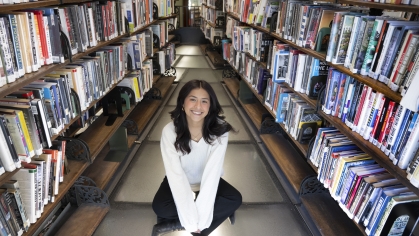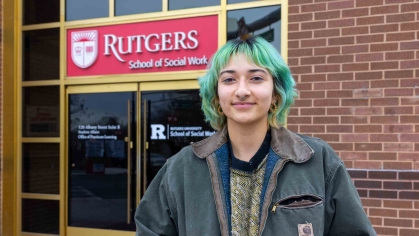Originally posted in Rutgers Today
Alaska Strouss is one of about 30 students currently receiving support through Rutgers’ Institute for Families
When Alaska Strouss started at Rutgers, she had a hard time relating to classmates when they talked about their family life. From the time she was a baby living in Arkansas, she and her twin sister were part of the foster care system, bounced from home to home until they were adopted at age 12 and moved to Missouri. Life seemed as if it would get better.
But two years later, when her adoptive father died suddenly, her mother started neglecting the two girls, refusing at times to even feed them, Strouss said.
“She was extremely neglectful for a number of years,” said Strouss, who was 17 at the time and living in Sicklerville, New Jersey, in a family home her mother inherited. “One day a Spanish teacher at school called the cops. My adoptive mother lost custody, so we ended up in the foster care system once again.”
Today, living off-campus with a roommate and still mandated by the court to be under the auspices of foster care until February when she turns 21, Strouss found the connection she needed as a Fellow supported by the Institute for Families (IFF) at the Rutgers School of Social Work. The program supports students like Strouss who have spent time in the child welfare system by providing emotional, academic and financial support.
“A lot of time, all I need is some advice,” says Strouss, who is majoring in psychology in the School of Arts and Sciences (SAS). “I never had guidance. When I hear other students saying they are going to call their mom, I think about how I never had anyone I could go to for support or comfort. Now I do.”
There are about 30 students currently involved in the IFF Fellows’ program, which has been in existence since 2013 and has provided support to 111 undergraduates who have gone through the child welfare system. While nationally only about half of those in the foster care system finish high school and only 5 percent graduate from college, 71 percent of IFF Fellows at Rutgers have received undergraduate degrees and 18 percent have gone on and finished graduate school.
Adam Staats, manager for the IFF Fellows’ program, says coordinators in the two programs in New Brunswick and Camden, which are supported by gifts and donations to the Transitions for Youth Program, provide coaching, and help students academically and with personal issues. The program also helps students leverage opportunities including access to grants and scholarships, food assistance, health services, emergency assistance funding, career development and other Rutgers services. Access to housing, for example, is critical for students who have no other options or support system to turn to. IFF also hosts community-building and recreational activities like barbecues, camping trips, talent shows, movie nights, cooking classes, and volunteer days.
“We have quite a few success stories, which is extremely gratifying,” says Staats. “Watching our Fellows cross the finish line are some of the happiest moments of my life.”
These stories include Tahj Burnette, a first-generation college graduate, who was in foster care for seven years, going from home to home until he was reunited with his mother and one of his brothers when he was in the ninth grade. He was angry about his situation much of his young life. But he had an older sister who graduated from Kean University and thought if she did it, he could too.
“I didn’t want to grow up and have my children go through the same thing,” said Burnette.
After graduating from high school, Burnette earned an associate degree from Middlesex County College before transferring to Rutgers where he completed an undergraduate degree in 2021. Burnette graduated with a 4.0 GPA and ranked number one out of 5,110 students from the School of Arts and Sciences. The following year, he earned his MSW, received the Dean’s Award of Excellence Scholarship and became a licensed social worker in New Jersey.
Burnette, 28, now works as an Educational Opportunity Fund (EOF) senior counselor for Rutgers School of Environmental and Biological Sciences (SEBS), helping dozens of students navigate school and life and encouraging them to look to the future. “I always felt imposter syndrome, that I wasn’t good enough,” said Burnette. “But Adam wowed me. He told me that he believed in me, something that I had never heard before.”
The IFF program gave Burnette the support and stability he needed. “I came to Rutgers a couple of months after the pandemic hit and everyone was sent home. I had nowhere to go. They let me stay on campus, gave me social support and a food stipend so that I could buy food.”
Instead of feeling like victims, Strouss and Burnette said the IFF program gave them the second chance they needed. Besides her studies at Rutgers, Strouss works 30 hours a week at various part-time jobs, including modeling clothes for Knight and Day Apparel, which sells Rutgers-branded merchandise.
She is saving money to buy a car and wants to build a bank account for the future. The most important goal for Strouss is to “break the cycle of drug addiction and homelessness” she faced.
“I want to make sure that my future children and their children will have money,” said Strouss. “This program helped me and now it’s up to me to make sure I do my part.”



